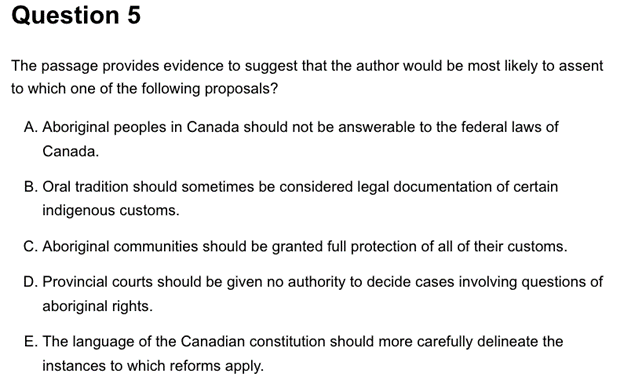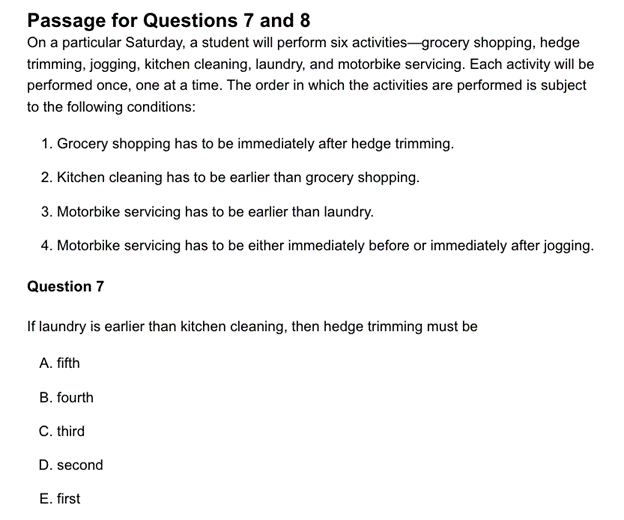Let's start with the truth: your LSAT score can significantly affect the trajectory of your legal career, since it’s the biggest factor in law school applications.
But since you’re here, let’s zoom back more: what is the LSAT exactly? The LSAT, which stands for Law School Admission Test, is a standardized test that serves as a critical benchmark for law school admissions.
With its unique format and challenging question types, the LSAT requires more than just rote memorization or regurgitation of facts. The test assesses your ability to think critically, analyze complex arguments, and comprehend dense legal texts—a true measure of your aptitude for law school.
So before you register to take the LSAT, we’re going to answer your common questions in this blog post:
What is the LSAT for?
What is on the LSAT?
How is the LSAT scored?
How hard is the LSAT?
How long is the LSAT?
How to study for the LSAT
When should I take the LSAT?
How much does the LSAT cost?
Let's begin!
TABLE OF CONTENTS
(click to skip ahead)What is the LSAT for?
The LSAT is one of the foremost components of the majority of law school applications, and is undoubtedly one of the most important law school requirements. Understanding its significance will help you grasp why it holds such weight in the law school admissions process.
Let's explore the primary functions of the LSAT:
Law school admissions evaluation
Law schools receive thousands of applications each year for limited spots. The LSAT provides a standardized measure for evaluating and comparing candidates. Admissions committees use LSAT scores as a benchmark to assess an applicant's aptitude for the rigorous academic demands of law school.
In other words, the LSAT helps law school admissions officers gauge your critical thinking skills, analytical reasoning abilities, and capacity for legal analysis—all qualities that are crucial for success in the legal profession.
Predictor of academic performance
Research shows a correlation between LSAT scores and law school performance. While it's not a foolproof predictor, a strong LSAT score can demonstrate your ability to handle challenging coursework and thrive in a law school environment.
Equalizer among applicants
The LSAT acts as a level playing field, allowing law schools to fairly evaluate candidates, regardless of their undergraduate college or major. Unlike undergraduate GPAs, which can vary significantly across institutions, the LSAT provides a standardized measure of intellectual ability.
Scholarship opportunities
Many law schools award scholarships based on academic merit and LSAT scores. A high LSAT score can make you a competitive candidate for scholarships, potentially reducing the financial burden of law school.
What is on the LSAT?
The LSAT consists of four multiple-choice sections and a writing sample. Of the four multiple-choice sections, you'll only receive scores for three sections:
Reading Comprehension
Analytical Reasoning (Logic Games)
Logical Reasoning
The fourth multiple-choice section, the Experimental Section, receives no score. The writing sample section is also unscored. Of course, there are good reasons for this. So, let's look at each section so you know what to expect.
LSAT Reading Comprehension
The Reading Comprehension Section measures your ability to understand and analyze dense, complex passages of text—the kind you'll frequently encounter in law school and legal practice.
In particular, this section will assess your ability to identify main ideas, draw inferences, and evaluate the author's argument or tone.
Number of Questions: 26-28
Time Limit: 35 minutes
Sample question from the LSAT Reading Comprehension section:
LSAT Analytical Reasoning (Logic Games)
The Analytical Reasoning Section, also known as Logic Games, challenges your ability to understand and analyze complex rules and conditions.
You'll encounter various scenarios, often presented as a game, and be asked to deduce relationships, make inferences, and solve logical puzzles.
Number of Questions: 24-26
Time Limit: 35 minutes
Sample question from the LSAT Analytical Reasoning section
LSAT Logical Reasoning
The Logical Reasoning Section presents you with a series of arguments and then asks you to evaluate their structure, identify assumptions, and draw logical conclusions.
This section will assess your ability to analyze and evaluate the strength of arguments, identify flaws in reasoning, and make deductions based on the provided information.
Number of Questions: 24-26
Time Limit: 35 minutes
Sample question from the LSAT Logical Reasoning section
LSAT Experimental Section
The unscored Experimental Section doesn't contribute to your final LSAT score—instead, it allows test developers to trial new questions and evaluate their difficulty and effectiveness.
Since you won't know which section is experimental, it's important to approach every section as if it counts towards your score. The Experimental Section can appear as an additional Logical Reasoning, Logic Games, or Reading Comprehension section.
Number of Questions: 22-28
Time Limit: 35 minutes
LSAT Writing Section
The Unscored Writing Sample Section presents a specific situation or scenario, often involving a controversial issue or a legal dilemma. You are then required to take a position, develop a reasoned argument, and support it with logical reasoning and relevant examples.
The goal is to demonstrate your ability to construct a persuasive and well-structured essay within the given time constraint.
Time Limit: 35 minutes
Check here for a practice Writing Prompt Sample for the LSAT.
LSAT Score
The LSAT scoring process involves two key concepts: the raw score and the scaled score.
LSAT raw score
The raw score represents the number of questions you answered correctly on the LSAT. For each correct answer, you receive one point. There is no penalty for incorrect or unanswered questions.
LSAT scaled score
The raw score gets converted into a scaled score, ranging from 120-180. Your scaled score is the score that law schools will consider when evaluating your application. It reflects your overall performance on the exam and is often the most significant factor in the admissions process.
The conversion process from raw to scaled score considers the difficulty level of the test version you took, ensuring that scores are comparable across different administrations.
For more information about LSAT scores, including what counts as a "good" LSAT score, the importance of LSAT percentiles, and how to make up for an average score, check out this article on the LSAT score range.
How hard is the LSAT?
The LSAT is, undoubtedly, a challenging exam. Still, according to the Law School Admission Council (LSAC), the majority of test takers have scored between 150-159 during the last five years.
Of course, defining the exact difficulty of the LSAT is subjective and can vary from person to person based on individual strengths, weaknesses, and preparation strategies.
Often, the perceived difficulty of the LSAT stems from several factors:
Complexity of questions
The LSAT presents questions that require careful analysis, strategic reasoning, and the ability to navigate through intricate scenarios. The complexity of the questions will help law school admissions evaluate your ability to think critically and make sound judgments, reflecting the demands of the legal profession.
The LSAT also includes question types that may be unfamiliar to test-takers at first, such as the Logic Games section. This section often requires test-takers to develop specific techniques and strategies to approach the questions effectively.
Time constraint
Each section of the LSAT has a significant number of questions to be completed in a short amount of time. This time pressure adds an additional challenge, as test-takers must efficiently manage their time while maintaining accuracy.
Standardized scoring
The LSAT is scored on a scale of 120 to 180. However, achieving a competitive score requires a solid understanding of the test format, content, and effective test-taking strategies. Thus, preparing for the LSAT involves investing time and effort in developing the necessary skills and familiarity with the exam, which can contribute to its perceived difficulty.
How long is the LSAT?
The total duration of the LSAT exam, including breaks, is approximately 2 hours and 30 minutes. You’ll get 35 minutes for each multiple-choice section, followed by 10-minute breaks.
You'll also have 35 minutes to complete the LSAT writing section. However, you'll typically complete this section of the LSAT at a different time and day. The writing sample prompt becomes available eight days before the start of your LSAT exam.
How to study for the LSAT
Preparing for the LSAT requires a strategic and systematic approach to maximize your chances of success. Here are some effective strategies to help you study for the LSAT.
Understand the exam
Familiarize yourself with the LSAT's structure, content, and question types (see sections above). Understanding the format and expectations of each section will allow you to tailor your study plan accordingly.
Develop a study schedule
You should dedicate regular, focused study sessions to cover all sections of the LSAT. That being said, you should create a study schedule that suits your needs and commitments. Break down your study plan into manageable tasks, allocating time for practice questions, timed practice tests, and review sessions. Consistency and discipline are key to making steady progress.
Use official LSAT prep materials
Take advantage of official LSAT prep materials provided by the Law School Admission Council (LSAC). The LSAC offers official practice tests, study guides, and sample questions that closely resemble the actual exam. These materials are essential for gaining familiarity with the test format and question styles.
Take full-length practice tests
By taking full-length practice tests, you can build endurance, practice time management, and gauge your progress. Then, analyze your performance on these tests to identify patterns, adjust your study approach, and assess your readiness for the exam.
Practice, practice, practice
Regularly engage in timed practice sessions to simulate the test environment and build your stamina. Solve a wide range of LSAT practice questions, focusing on understanding the underlying concepts, developing efficient problem-solving techniques, and improving speed and accuracy.
Analyze your performance
Review your practice test results and analyze your performance in detail. Try to identify your strengths and weaknesses across different question types and sections. Then, pay close attention to your errors and develop strategies to improve in areas where you face challenges. Learning from your mistakes and refining your approach will lead to progress over time.
Seek guidance and support
Consider joining an LSAT prep course or seeking guidance from experienced tutors. They can provide expert advice, clarify concepts, offer valuable strategies, and provide feedback on your practice essays. Additionally, you can connect with fellow test-takers or join study groups to share resources, discuss challenging questions, and gain different perspectives.
Take care of yourself
Maintaining your physical and mental well-being is essential during LSAT preparation. Get enough sleep, eat well, and exercise regularly to keep your mind and body in optimal condition. Take breaks when needed to avoid burnout and engage in activities that help you relax and recharge.
Stay motivated and positive
Studying for the LSAT can be challenging at times, but maintaining a positive mindset and staying motivated will contribute to your success. Celebrate small victories, stay focused on your goals, and remind yourself of the reasons why you want to become a lawyer.
When should I take the LSAT?
Here are the official test dates and registration deadlines for the rest of 2023 and the first half of 2024, followed by how to think through planning your test date/s:
2023 LSAT Test Dates
| Dates | Registration Deadline |
|---|---|
| January 13-14 | December 1, 2022 |
| February 10-11 | December 27, 2022 |
| April 14-15 | Mar 2, 2023 |
| June 9-10 | April 25, 2023 |
| August 11-12 | June 29, 2023 |
| September 8-9 | July 25, 2023 |
| October 13-14 | August 31, 2023 |
| November 10-11 | September 28, 2023 |
2024 LSAT Test Dates
| Dates | Registration Deadline |
|---|---|
| January 12-13 | November 30, 2023 |
| February 9 | December 26, 2023 |
| April 12 | February 29, 2024 |
| June 7-8 | April 23, 2024 |
However, you shouldn't choose a test day solely because it fits your schedule. Here are some other factors you should consider before deciding when you should take the LSAT.
Law school application deadlines
Research the application deadlines for the law schools you plan to apply to. Take note of the LSAT score submission deadlines as well. Ideally, you should aim to take the LSAT well before these deadlines to allow ample time for score reporting and completing your applications.
Preparation time
Consider the amount of time you need to adequately prepare for the LSAT. The recommended preparation duration can vary depending on your individual circumstances, such as your familiarity with the exam content, your study schedule availability, and your desired score improvement. Most test-takers spend several months preparing.
Study progress and readiness
Take practice tests and gauge your performance to determine if you consistently score within your target range. Ensure you have covered the necessary content areas, developed effective test-taking strategies, and built the skills to confidently tackle the exam.
Personal commitments
Choose a timeframe when you can dedicate sufficient time and energy to LSAT preparation without being overwhelmed by other obligations, such as work, family, or academic responsibilities.
Retake options
You have the option to retake the LSAT if you are not satisfied with your initial score. Therefore, leaving enough time for retakes before application deadlines is advisable. Law schools often consider your highest LSAT score, so taking the exam more than once can improve your chances of getting into a top law school.
How much does the LSAT cost?
Currently, registering for the LSAT costs $222. In addition to that standard fee, there are also several additional costs you should be aware of.
Credential Assembly Service subscription
The Credential Assembly Service (CAS) subscription is a service provided by the Law School Admission Council (LSAC). The CAS subscription helps streamline the law school admissions process by collecting, authenticating, and distributing your application materials to the law schools you apply to.
The CAS subscription costs $200. Each CAS report costs $45.
LSAT Score Audit
The LSAT Score Audit is a process offered by the LSAC that allows test-takers to request a review and verification of their LSAT scores. Requesting to audit your LSAT score costs $150 (or $75 if you have been pre-approved for a fee waiver).
Test Date Change
If you cannot take the LSAT on the date you initially registered for, LSAC allows you to change your test date to a different administration.
You can request to change the test day for free if it's done by the test administration’s registration deadline. It costs $135 if you make the request up to 10 days after the deadline. After that, it costs $222 to change your test date.
Final thoughts
The LSAT will push you to your intellectual limits and test your ability to solve intricate problems. However, by embracing this challenge and dedicating yourself to thorough preparation, you can conquer the LSAT and unlock doors to your dream law school.
Remember, the LSAT is not just a test—it’s a stepping stone toward your future legal career. So, take advantage of the multitude of study resources available, such as prep books, practice tests, and online courses.
If you're looking for personalized guidance to help you prepare for law school, we recommend speaking with our graduate school admissions consultants. We can help you craft a strong law school personal statement and navigate the law school application process.
If you want to explore support, schedule a consultation and begin taking the next step in your law school journey!
Ameer is a freelance writer who specializes in writing about college admissions and career development. Prior to freelancing, Ameer worked for three years as a college admissions consultant at a Hong Kong-based education center, helping local high school students prepare and apply for top colleges and universities in the US. He has a B.A. in Latin American Studies from the University of Chicago and an M.A. in Spanish Linguistics from UCLA. When he’s not working, Ameer loves traveling, weight lifting, writing, reading, and learning foreign languages. He currently lives in Bangkok, Thailand.
Top values: Growth / Diversity / Empathy














